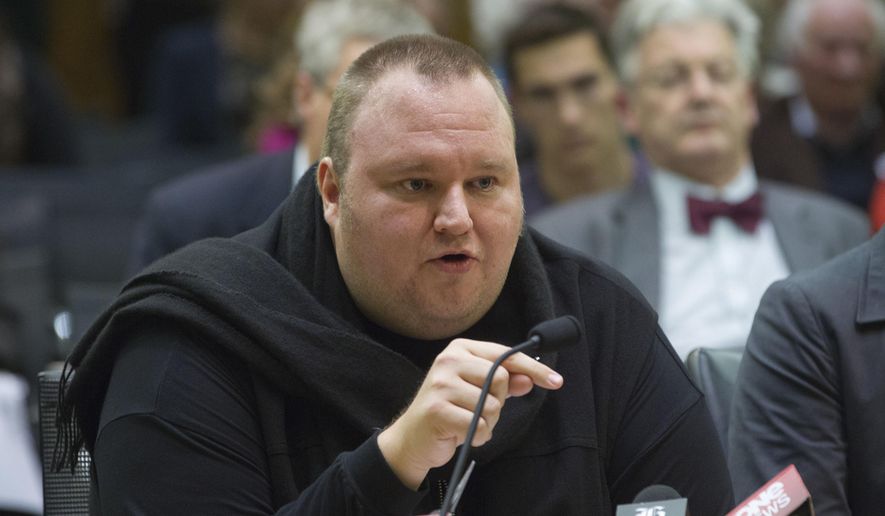Extradition proceedings have finally begun for Kim Dotcom, the supposed cybercriminal at the center of the U.S. government’s largest-ever online piracy case, but it could be weeks before a New Zealand judge decides whether to send the case stateside.
Following nearly four years of international legal disputes, extradition matters started Monday in Auckland for Mr. Dotcom, 41, and three colleagues who helped run his highly successful online storage site, Megaupload, before it was seized by American authorities in January 2012.
The Department of Justice has been gunning ever since to get Mr. Dotcom and his associates into a U.S. courtroom to face charges of large-scale copyright infringement, money laundering and racketeering.
The Justice Department alleges Megaupload cheated Hollywood out of $500 million by providing a service in which large files, including pirated movies, could be stored online and subsequently shared. Former Megaupload employees Mathias Ortmann, Finn Batato and Bram van der Kolk are also currently on trial.
A one-time programmer for the site, Andrus Nomm, surrendered to U.S. authorities in February and is now serving a 366-day prison sentence.
Judge Nevin Dawson is expected to rule within the next month whether the subjects of the so-called “Mega Conspiracy” will be extradited, which the defendants have fought against tooth and nail for years. Proceedings had been delayed nine times before finally getting underway this week.
“This case is not just about me. This case is about how much control we allow U.S. corporations and the U.S. government to have over the Internet,” Mr. Dotcom, born Kim Schmitz, said on Twitter before Monday’s hearing.
Ron Mansfield, an attorney for Mr. Dotcom, said that the case should be altogether dropped since New Zealand copyright law contains a safe-harbor provision for Internet service providers, according to Stuff.
Another lawyer, Grant Illingworth, argued that the defendants need to access frozen funds before they’re forced to fend off criminal allegations any further.
“The issue at this stage isn’t whether they will have a fair trial when they are extradited, but whether they will have a fair extradition hearing,” Mr. Illingworth said.
Indeed, the next several weeks worth of proceedings in Auckland won’t revolve around whether the accused violated the law; rather, U.S. prosecutors will argue the necessity of bringing them across the ocean to stand trial in the Eastern District of Virginia.
Meanwhile, the U.S. government has seized tens of millions of dollars from the defendants’ bank accounts after having branded them “fugitives of the law” for failing to surrender to American authorities.
“The amounts that are being sourced to brief the U.S. expertise are modest in comparison,” Mr. Illingworth said Monday.
Earlier this year, a defiant Mr. Dotcom told The Washington Times that he’s confident he’ll beat the extradition case, but warned of the precedent that might be set if he’s wrong.
“The U.S. government wants to extend the jurisdiction of U.S. courts globally,” he said. “My case is the best example: a foreigner who’s legally fighting extradition was labeled fugitive by a U.S. court and robbed of all his global assets without due process.”
• Andrew Blake can be reached at ablake@washingtontimes.com.




Please read our comment policy before commenting.